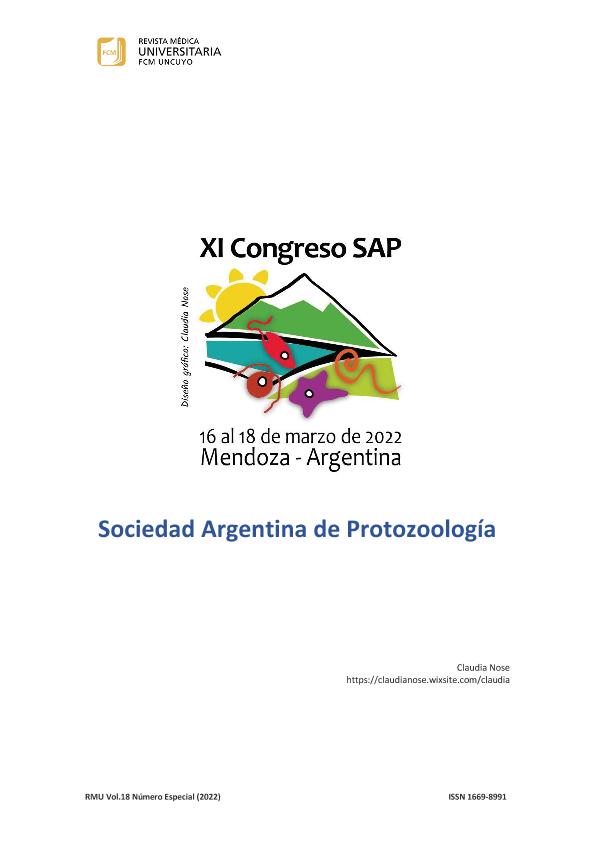Evento
A versatile CRISPR/Cas9 editing approach in Trypanosoma cruzi
Vilchez Larrea, Salomé Catalina ; Prego, Alejo Facundo
; Prego, Alejo Facundo ; Schoijet, Alejandra Cecilia
; Schoijet, Alejandra Cecilia ; Llanos, Manuel
; Llanos, Manuel ; Alberca, Lucas Nicolás
; Alberca, Lucas Nicolás ; Bellera, Carolina Leticia
; Bellera, Carolina Leticia ; Gavernet, Luciana
; Gavernet, Luciana ; Talevi, Alan
; Talevi, Alan ; Alonso, Guillermo Daniel
; Alonso, Guillermo Daniel
 ; Prego, Alejo Facundo
; Prego, Alejo Facundo ; Schoijet, Alejandra Cecilia
; Schoijet, Alejandra Cecilia ; Llanos, Manuel
; Llanos, Manuel ; Alberca, Lucas Nicolás
; Alberca, Lucas Nicolás ; Bellera, Carolina Leticia
; Bellera, Carolina Leticia ; Gavernet, Luciana
; Gavernet, Luciana ; Talevi, Alan
; Talevi, Alan ; Alonso, Guillermo Daniel
; Alonso, Guillermo Daniel
Tipo del evento:
Congreso
Nombre del evento:
XI Congreso de la Sociedad Argentina de Protozoología
Fecha del evento:
16/03/2022
Institución Organizadora:
Sociedad Argentina de Protozoología;
Título del Libro:
Libro de resumenes del XI Congreso de la Sociedad Argentina de Protozoología
Título de la revista:
Revista Médica Universitaria
Editorial:
Universidad Nacional de Cuyo
ISSN:
1669-8991
Idioma:
Español
Clasificación temática:
Resumen
Development of CRISPR/Cas9 as a tool for genomic edition brought a new perspective to the study of Trypanosoma cruzi, an organism usually reluctant to other gene editing technologies. Most often, epimastigotes are co-transfected with a single plasmid bearing both the gene for Cas9-GFP expression and a sequence to be translated into a single guide RNA (sgRNA), jointly with a lineal donor DNA encompassing a selection marker flanked by sequences homologous to the target gene. Here, we tested an alternative approach for the generation of Phosphodiesterase (PDE) knockout parasites. We obtained epimastigotes from Tul II strain stably expressing Cas9-GFP in the nucleus in all parasite stages, with no detrimental effects on epimastigote growth or differentiation nor on trypomastigote infection capability. These Cas9-GFP epimastigotes were co-transfected with the sgRNA + DNA donor pair, according to the intended gene target. sgRNA were obtained by in vitro transcription using a template DNA bearing the specific + scaffold sequence under a T7 promoter. To obtain the donor DNA we designed a "pre-donor" formed by a sequence including several restriction enzyme recognition sites flanked by 30-bp arms homologous to the sequence adjacent sgRNA annealing target. This "pre-donor" allowed to easily generate a variety of donor DNAs by cloning alternative selection markers. DNA extracts (boiling-preps) from 4-day post-transfection cultures were evaluated by PCR using "mixed" primer pairs: while one of the primers annealed to the target gene, the second primer annealed to a sequence in the donor DNA, allowing assessment of its correct insertion in the gene of interest. Advantages of this take on CRISPR/Cas9 edition include its versatility for choosing and switching between alternative selection markers and a quick and affordable generation of the components of the system and analysis of the transfected cultures, while possibly facilitating complementation assays on the KO lines.
Palabras clave:
Chagas disease
,
Trypanosoma cruzi
,
CRISPR/Cas9
Archivos asociados
Licencia
Identificadores
Colecciones
Eventos(CCT - LA PLATA)
Eventos de CTRO.CIENTIFICO TECNOL.CONICET - LA PLATA
Eventos de CTRO.CIENTIFICO TECNOL.CONICET - LA PLATA
Eventos(INGEBI)
Eventos de INST.DE INVEST.EN ING.GENETICA Y BIOL.MOLECULAR "DR. HECTOR N TORRES"
Eventos de INST.DE INVEST.EN ING.GENETICA Y BIOL.MOLECULAR "DR. HECTOR N TORRES"
Citación
A versatile CRISPR/Cas9 editing approach in Trypanosoma cruzi; XI Congreso de la Sociedad Argentina de Protozoología; Mendoza; Argentina; 2022; 124-124
Compartir



